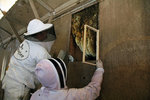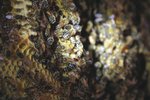

The bees are swarming now that spring has arrived, giving some people the heebeegeebees.
For others, it’s their favorite time of year.
“I live for this time of year,” said Rob Jenkins, of Bee Wrangler Honey, based in Ethel.
Not only is it an opportunity to carve out people’s unwanted hives and capture swarms, it’s also a time for community service and fun — for those who aren’t afraid of possibly getting stung, anyway.
Hobby beekeeper Jan Opsitnick said the group, called South Lewis County Beekeepers, basically does everything it can to rescue bees and give them a safe place to live when going on a capture.
On May 9, a group of about one dozen beekeepers and some people looking to get into the hobby traveled to a farm west of Centralia where a colony had built its home between two studs in the wall of a barn.
Before cutting away the inside panel of the barn wall, Jenkins drilled a hole and stuck in the lens of his new inspection camera to get a better view of where the colony had made its honeycomb home.
With the wall opened up, thousands of bees were visible, crawling and flying around their about 2- to 3-foot-tall hive, staying primarily closer to the top of their home. Using a hive frame, Jenkins scored the first few sections of honeycomb from the bottom of the hive, and then cut them away to be framed.
Group members took turns placing usable sections of comb in frames and securing the pieces in place with fishing line.
As the process continued and the group got closer to the top of the hive, the excitement grew when the hexagons in the honeycomb contained brood — bee eggs or larvae — or oozed with honey.
The group of about one dozen beekeepers and newbies divided what they collected based on who needed what. The new beekeepers were in need of bait — sections of honeycomb to entice bees to make their home — brood and bees. Others were happy to get some fresh honey.
The queen of the hive wasn’t located, but Jenkins said he doesn’t really focus on capturing queens. They aren’t necessary for the colony’s survival because the bees can create new queens. After hatching, all bee larvae are fed royal jelly — a substance produced by worker bees. The queen larvae are fed it exclusively and will become sexually mature female bees, unlike female worker bees.
The beekeepers worked at the farm for about four hours, and still had work to finish later as the top of the hive wasn’t easily accessible.
While Saturday night’s job is the type that can be scheduled weeks in advance, many of the beekeepers also provide swarm capture services. While a colony has already built its home, a swarm is a cluster of bees looking for a new place to live.
Jenkins explained that swarm captures require a quick response because it might be there a few hours or a few days; there’s no way of really knowing.
The South Lewis County Beekeepers are on Facebook. The group isn’t formal; it’s just a group of friends who enjoy the same hobby, Opsitnick said.
The group is open to helping new beekeepers learn about the hobby and how to do a carveout. Saturday Chuck Preble and his two sons, William and Charlie, traveled from Tacoma to learn about carveouts and collect honeycomb, brood and bees to start his hobby hives.
“We love to help new people,” Jenkins said. “We love to educate people.”